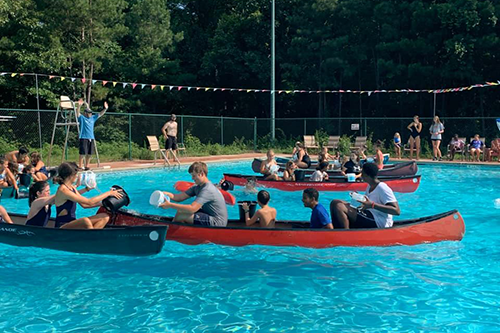
Summer camps are places of discovery for young people, so it’s no surprise that co-op organizations in North America have been offering a co-op twist on the experience to help share the movement’s values.
One example is the Cooperative Leadership Camp, run by the Cooperative Council of North Carolina (CCNC). Now in its 85th year, it hosts up to 100 teenagers from across the state, giving them the opportunity to experience life running a co-op, alongside traditional camp activities like canoeing, hiking and archery.
This year the camp runs from June 20-24 at Camp Monroe in Laurel Hill. Throughout the week, young people are thrown into a simulation of building and managing a t-shirt worker co-op, where they must apply co-op principles and values them while responding to challenges.
“It’s a really crazy week,” says Emily Nail, Executive Director of CCNC. “The biggest thing that comes out of it is they learn what a co-op is. A lot of these students don’t understand that a co-op is a business option, and they don’t have that education in their high school curriculum.”
Nail says CCNC’s summer camp is a “hands-on experience… like a cultural immersion.” This is different from communication through other means, such as social media, because it is woven into a life experience that involves not only a focus on co-ops, but a chance to develop socially in a new environment, mixing with young people from different parts of the state.
Attendees say the camp has had a profound effect on them. One young person, Gabbi, who attended camp in 2018, reflected on the experience. “Before I came [to camp], a leader to me was doing all the work and telling people what to do. But here it’s like everybody’s a leader and everybody takes charge.”
Attending the same year was Abbie, who said: “I’ve noticed that when working in groups there’s times when you step up and take the lead and times when you don’t. You’ve got to recognize those times you do take the lead, recognize your strengths and weaknesses and notice when somebody else is stronger at something than you are and let them take the lead.”
Another young person, Hope, said camp had “taught me more about co-ops… I met a lot of new, interesting people who were like-minded and we talked about goals in life. I thought that was an interesting thing to see, that there’s other people my age who want to go and do great things in this world.”
Nail has seen the camp “opening students’ eyes” to co-ops. Many go on to participate in the movement, from supporting co-op brands to joining as members or employees. She tells the story of Marshall Cherry, who was sponsored by Roanoke Electric Cooperative to attend the camp as a teenager, and this year became its CEO.
“These students are going to be our future leaders and several of our co-ops want them to come back with an interest in making their community thrive.” – Emily Nail, Executive Director, Cooperative Council of North Carolina
“He went to camp back before I was born, and was sponsored by Roanoke Electric, and had no idea what a co-op was,” Nail says. “He went back to school, went to college, came back home and went to Roanoke and said, ‘You sent me to camp when I was a high schooler. I know what a cooperative is. I know what the cooperative difference is. Do you have a job for me?’ And so they hired him. And now a couple decades later, he is their new CEO. And has stayed with Roanoke the whole time.”
She adds: “These students are going to be our future leaders and several of our more rural co-ops want them to come back with an interest in making their community thrive, and continuing that business model.”
In Canada, the Alberta Community & Co-operative Association (ACCA) has been running the Co-operative Youth Leadership program since 1957, inviting 200 teenagers a year to Nordegg in the Rockies for a week of outdoor adventure and co-op activities.
ACCA says the camp “motivates youth with living examples of how local cooperative and agricultural organizations are influential key players in building and maintaining communities.” They encourage co-ops to sponsor participants’ attendance, adding: “Many of these youth will become active members in your co-op or credit union and active volunteers and influencers in their community.”
Canada’s longest running cooperative summer camp is run by the Saskatchewan Co-operative Association (SCA), now under the banner of Camp Kindling. In 1928, SCA set up a summer Co-op School to communicate how co-ops support Saskatchewan farmers. Sharing the benefits of the co-op model with young people was seen as essential to the continuation of the movement in Saskatchewan.
In the 1970s, the program changed its name from Co-op School to Saskatchewan Co-operative Youth Program, marking a shift from formal teaching to hands-on immersive experiences with a greater focus on personal and collective development within a cooperative context.
Now with almost 45,000 alumni, Camp Kindling says the camp’s longevity is “an unmistakable sign that the program has truly touched the lives of Saskatchewan people.”
Another camp, Co-operative Young Leaders (CYL), is run by the Ontario Co-operative Association. This week-long summer camps take place at the Co-operative Education Centre near Aylmer Ontario, at the Gay Lea Dairy Museum. Over 3,500 young people aged 13 to 18 have attended since 1967.
Ebony, a senior participant in 2019, said in a testimonial: “I know I will never forget my time at CYL and that I will probably end up choosing co-op business as a career path. [The camp director], the other facilitators and the program of CYL has inspired me to use my life this way.”
Ebony’s remarks resonate with others who spoke about what they got from attending a summer camp—the value of a shared human experience. Young people who attend these camps gain their understanding of the cooperative difference from these collective experiences, and the memories they take away.


